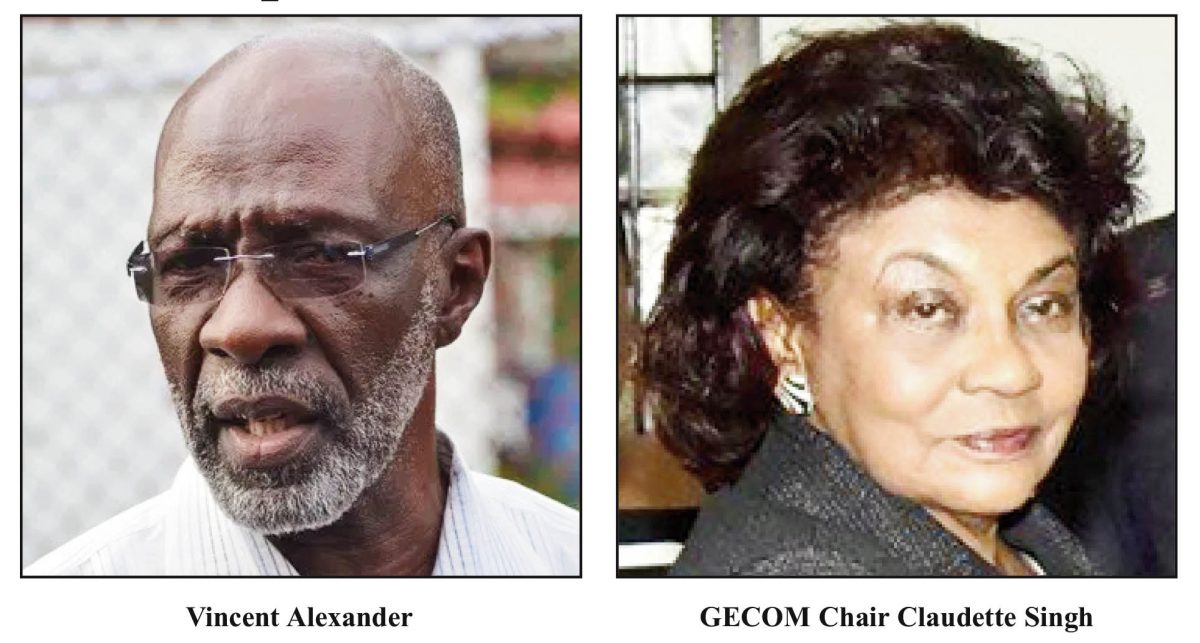Chair of the Guyana Elections Commission (GECOM) retired Justice Claudette Singh on Tuesday shot down yet another motion by the Opposition-nominated Commissioners to have the March 2020 polls reviewed internally.
Late last month, Commissioner Charles Corbin tabled a motion seeking to have GECOM “commission its own independent review to gain a better understanding of the bases for the aforementioned allegations and occurrences and to consider if there are existing or potential weaknesses in the processes employed by GECOM for the conduct of elections.”
That motion came on the heels of a June 14 ruling by Singh where she decided against an internal review of the elections. She had argued that a review of the controversial elections would be the responsibility of an elections court and not the Commission. She said that it is important to distinguish between a review of GECOM’s processes in effectively conducting an election and an investigation into what actually transpired during a particular election. She reasoned that a review of GECOM’s processes in effectively conducting an election examines the effectiveness of the system that is in place to ensure that an election is carried out in accordance with the law, which may include the consideration of claims made in respect of a particular election to ascertain whether there are (potential) weaknesses in the system that need to be addressed.
Yesterday, both Commissioners Vincent Alexander and Sase Gunraj confirmed that the second motion was ruled against.
Alexander told Stabroek News that the Chair reiterated her previous arguments that the review would mean violating Article 163 of the constitution which puts all election-related matters in the hands of a competent Elections Court. However, Alexander says he disagreed with the reasoning and countered that the Opposition-nominated Commissioners were very “specific” in what they asked for.
“According to her [Singh] what we are asking for is provided for in Articles 162 and 163 of the constitution. We do not agree because she selectively chose aspects and did not speak to all of the motion. The motion specified that they were not asking for the model of conduct to be similar to what the court would do,” he said.
Alexander added that the Opposition grouping would now document their dissent on the matter and leave it in the public domain.
According to Corbin’s motion, the 2020 elections were the subject of much controversy. He explained that the pre-election period involved numeric disparities between the actual eligible population and the electoral roll while the post elections tabulation of the results revealed a significant discrepancy between the number of ballots cast and the eligible number of persons who could have reasonably been expected to do so legitimately. His motion also submitted that during the recount a number of anomalies were placed on the record.
The motion further stated that GECOM has determined that the most it can do in this regard is to examine its processes to see whether there are gaps or weaknesses that make it possible for votes to be counted for persons who could not have voted. It added that allegations in relation to voter impersonation may have been anchored in the excess number of entries recorded in the electoral roll.
“…during the Recount, documents were submitted in support of some of the allegations of impersonation; AND WHEREAS during the Recount, numerous documents of significance could not be accounted for; AND WHEREAS the missing documents rendered the validation of the associated ballots impossible, AND WHEREAS the count in District Four became contentious and the subject of judicial review; AND WHEREAS many other untoward incidents were reported,” the recital to the motion stated.
Corbin argued that by virtue of the invocation of Article 162 of the Constitution and the Removal of Difficulties provision of the Representation of the People Act, GECOM acknowledged that difficulties had arisen, many of which were identified in the recount process. He added that while the Commission has acknowledged that some of the allegations were of a serious nature, it has the mandate to ensure that they are addressed.
“…BE IT FURTHER RESOLVED that recommendations be sought in an effort to improve on the methods and processes employed in the electoral system and to remove the bases for the possible reoccurrence of the maladies, procedural or otherwise, that occurred or may occur under the current electoral process,” the resolve clause concluded.
The motion was seconded by fellow Opposition-nominated Commissioner Desmond Trotman.
In her written decision striking down the first motion, the Chair proffered that “GECOM is not a court of law and therefore has no authority to determine whether an election was lawfully conducted, and no such power was conferred on it under Article 162 (1) (b). A perusal of Articles 162 and 163 shows that the Constitution clearly and sharply separates the functions of GECOM and the High Court respectively in matters of electoral laws. “The Commission does not have, and cannot clothe itself with, the powers of a Court of Law to examine and re-examine witnesses or to procure official documents to determine the truth of the allegations contained therein. Any such question can only be determined by way of an election petition filed in the High Court.”






